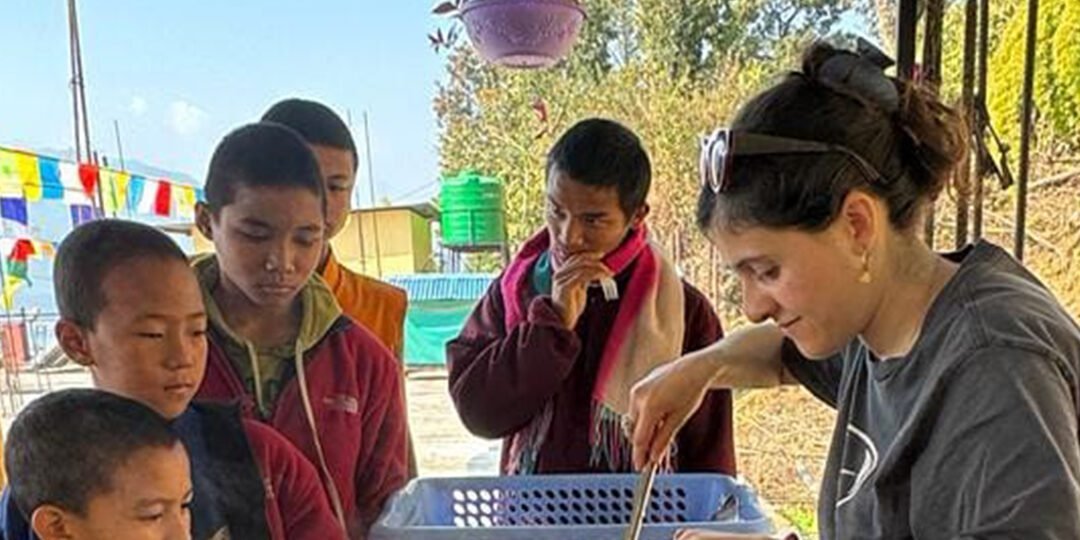Ir de voluntaria a Kaskikot (Pokhara) Nepal:
Marta Caceres
Volunteering in Kaskikot (Pokhara)
Allí, la gente va al médico sólo cuando están realmente mal, y confían plenamente en él. Casi nunca se quejan. En su lugar, hacen lo posible por superar su problema y, si no pueden, aceptan la situación sin lamentarse.
Sin embargo, me sorprendió la falta de algunas medicinas y material en el sistema público. En algunos casos, la gente tiene que pagar todas las pruebas y tratamientos. Para ello, se ven obligados a pedir un crédito, y quedan endeudados durante el resto de su vida. No todo el mundo puede permitirse ésto, o siquiera pagarse el poco dinero que se les pide por cada medicamento (a veces menos de un céntimo de euro por pastilla), y mucho instrumental médico que teníamos había sido donado por ONGs.
Aparte del tema del voluntariado, pude conocer el carácter encantador de la gente nepalí: siempre están ayudándose mutuamente (como si fueran todos una gran familia), y siempre sin prisa; con mucha calma. Sin embargo en Katmandú, los vendedores pueden llegar a ser muy pesados: te agobian y te persiguen a todas partes, intentando que compres sus cosas. Creo que lo más bonito fue ver la vida como la ven allí; como algo que ocurre, y en consecuencia aceptando lo que va viniendo de la mejor forma posible. Sin perder la serenidad, y con una sonrisa, a ser posible.
Por supuesto, otra cosa importante que he aprendido con esta experiencia ha sido el mismo idioma nepalí: Rupa y Mat son los profesores en VSN que me impartieron el “curso de supervivencia” los primeros días, cuando llegué. Más tarde, les agradecí a través de la distancia como 20 veces al día todos los ejercicios que hicimos… Fue muy útil, y resultaba mucho más fácil así aprender nuevas palabras y frases como voluntaria. Tras el mes que estuve en Nepal ya era capaz de mantener una conversación -cortita- en nepalí. Es un idioma fácil de aprender, aunque tiene también algunas estructuras gramaticales rebuscadas. Tal vez hubiera estado bien el haber tenido más clases, durante el periodo del voluntariado, para haber aprendido las frases típicas que usa la gente cuando va al puesto de salud. Aprender el idioma del país ayuda muchísimo a integrarse en una cultura diferente, como es la suya.
Mirando hacia atrás, hubiera sido mejor quedarse 2 o 3 meses en lugar de 1, porque justo cuando llegó el momento de irse era cuando mejor preparada estaba para trabajar en el puesto de salud. Y además era entonces cuando mi nepalí comenzaba a “despegar”…
Ésta ha sido una de las mejores experiencias que he tenido. Creo que los programas que está desarrollando VSN son realmente útiles para la gente local. Y me ha gustado mucho la forma de vida nepalí así que, cuando termine Medicina, tal vez vuelva para quedarme algún tiempo más…
Marta C
Marta Caceres
Volunteering in Kaskikot (Pokhara)
Volunteering in Nepal has been one of the nicest experiences I’ve had, mostly for what I’ve learned. I volunteered in Kaskikot, which is a town near Pokhara, helping in a little Health Post, and this way I’ve been able to see how different Medicine is practised there from what I’m used to, here in Spain.
There, people go to the doctor only when they are really ill, and they trust the doctor completely. They hardly complain. Instead, they try their best to get over it and, if they can’t, they accept the situation without mourning.
However, I was surprised with the shortage of some medicines and materials of the public medical system. For some problems, people have to pay the whole of the treatment and, because of this; they have to take out a loan that lasts for the rest of their lives. Not everyone can afford to pay the little money required to get certain medicines, and many medical instruments we had had been donated by charities.
Besides the volunteering, I got to know the charming character of the Nepalese: they are always helping each other (as if they all were a big family), never in a hurry and always looking calm.On the other hand, in Kathmandu, shopkeepers can be very annoying; they pursue you everywhere, trying to make you buy their goods.
I think the nicest thing was to live life as they do; to take it easy and face things as they come, never loosing one’s temper, and with a big smile whenever possible.
Of couse another important thing I learned with this experience is Nepalese itself: Rupa is the teachers at VSN who taught me the “survival course” on arrival. Later I thanked them about 20 times per day in my thoughts for all the practice…It was very useful and much easier afterwards to catch new words and sentences while volunteering.
I stayed one month in Nepal, but still I was able to have a -short- conversation in Nepalese when I came back. It is an easy language to learn, except for some grammatical structures. Maybe it would have been good to have had more classes during the volunteering too, in order to learn useful structures people used when they came to the Health Post. I believe learning the language is a great idea when trying to get into a foreign country’s culture.
Looking back, it would have been better to stay at least for 2 or 3 months rather than 1 because, just when it was time for me to go back, was when I was best prepared, to handle work at the Heath Post. And it was then that my Nepalese was starting to become “good”…
Nevertheless, this has been one of the best experiences I’ve had. I think the programmes VSN are carrying out are really useful for the local people, and I’ve liked the Nepalese way of life very much, so, when I finish my medical studies I may be coming back to stay a bit longer.


